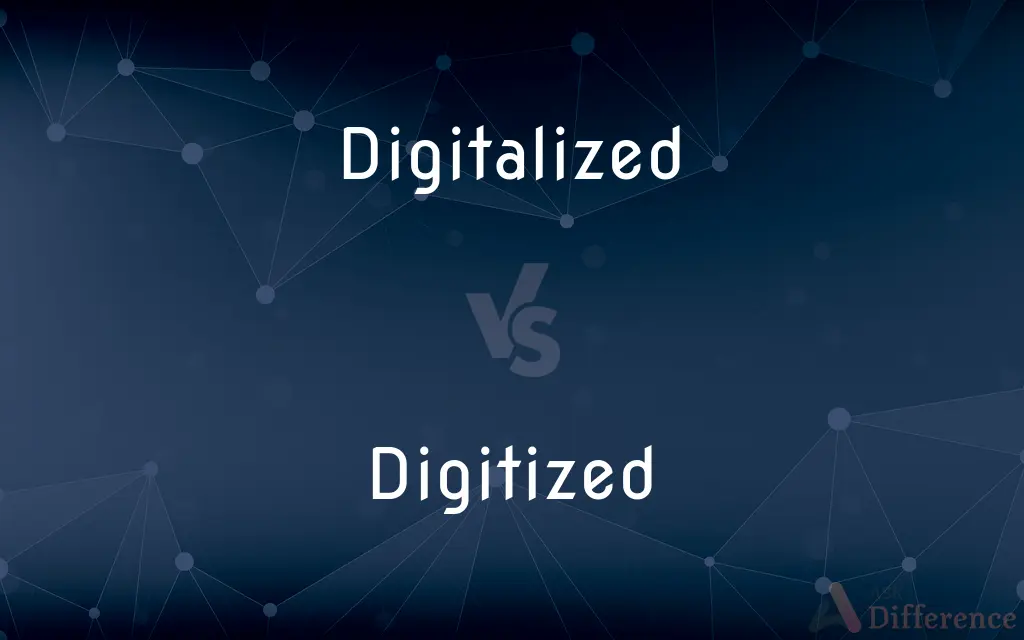Digitalized vs. Digitized — What's the Difference?
By Tayyaba Rehman & Fiza Rafique — Updated on April 1, 2024
Digitalization involves integrating digital technologies into all areas of a business, while digitization refers to converting analog information into digital format.

Difference Between Digitalized and Digitized
Table of Contents
ADVERTISEMENT
Key Differences
Digitalization is a broader process that encompasses the transformation of business operations, models, and cultural aspects by leveraging digital technologies and data. It aims to improve efficiency, value creation, and innovation. On the other hand, digitization is the technical process of converting information from analog to digital form. This is a more straightforward concept focusing on creating digital versions of physical or analog materials, such as scanning a paper document into a PDF file or converting VHS tapes to digital videos.
For instance, digitalizing a company might involve adopting digital tools for better customer engagement, data analytics for strategic decisions, and digital platforms for new services or products. Digitization is often the first step towards digitalization, as it creates the digital data that can then be used in digitalized processes.
Digitalization requires a strategic approach, involving changes to organizational structure, culture, and workflows. It's not just about technology but about leveraging digital tools to change how a business operates and delivers value to its customers. Digitization, however, is more about operational efficiency and accuracy. By converting information to digital form, organizations can easily store, search, and manipulate data. This process is critical for businesses looking to digitalize their operations, as having digital data is a prerequisite for many digital technologies and processes.
While digitalization can lead to profound changes in how a business competes and serves its customers, digitization is a necessary but more foundational step. It prepares the ground for the more transformative processes involved in digitalization.
Comparison Chart
Definition
Integration of digital technologies into all areas of a business.
Converting analog information into digital format.
ADVERTISEMENT
Scope
Broad, affects business models, operations, and culture.
Narrow, focused on the conversion process.
Objective
Enhance efficiency, innovation, and value creation.
Improve operational efficiency and data accuracy.
Impact on Business
Transformative, leading to new ways of conducting business.
Foundational, enabling further digital processes.
Example
Implementing an AI system for customer service.
Scanning paper documents into PDF files.
Compare with Definitions
Digitalized
Leveraging digital data for decision-making.
Businesses digitalize their marketing strategies by using data analytics.
Digitized
Transforming analog photos into digital images.
Family memories are preserved by digitizing old photo albums.
Digitalized
Integrating digital solutions for better workflow management.
Digitalizing inventory management with RFID technology optimizes supply chains.
Digitized
Changing analog video recordings to digital formats.
Digitizing home videos protects them from degradation over time.
Digitalized
Transforming business operations through digital technologies.
Digitalizing customer service with online chatbots improves efficiency and satisfaction.
Digitized
Transferring paper-based maps to digital GIS systems.
Digitized maps offer enhanced features like zoom and search.
Digitalized
Enhancing customer engagement through digital platforms.
Retailers digitalize shopping experiences with mobile apps.
Digitized
Converting text documents into digital formats.
Digitizing historical records preserves them and makes them easily accessible.
Digitalized
Incorporating digital tools into product development.
Digitalized product design using 3D modeling software accelerates innovation.
Digitized
Recording analog audio into digital files.
Digitizing vinyl records saves the music in a more durable format.
Digitalized
To administer digitalis in a dosage sufficient to achieve the maximum therapeutic effect without producing toxic symptoms.
Digitized
To put (data, for example) into digital form.
Digitalized
To digitize.
Digitized
Simple past tense and past participle of digitize
Digitalized
Simple past tense and past participle of digitalize
Digitized
That has been converted from analog to digital
Common Curiosities
What is digitalization?
Digitalization is the process of using digital technologies to change a business model and provide new revenue and value-producing opportunities.
What is digitization?
Digitization is the process of converting information from analog to digital format.
Can a business be digitized without being digitalized?
Yes, a business can convert its information into digital form without integrating digital technologies into all areas of its operations.
How does digitalization differ from digitization?
Digitalization involves a broader transformation including business models and operations, while digitization focuses on converting analog data to digital form.
Can digitalization affect a company's culture?
Yes, digitalization can significantly impact a company's culture, necessitating a shift towards a more digital mindset.
What does digitalization involve?
It involves adopting digital technology in all areas of a business, changing how it operates and delivers value to customers.
Are there any challenges associated with digitalization?
Challenges include the need for significant investment, changing organizational culture, and ensuring data security.
What industries benefit from digitization?
All industries can benefit, particularly those with extensive physical records, such as healthcare, education, and government services.
Is digitization necessary for digitalization?
Yes, digitization is a foundational step for digitalization, providing the digital data needed for further digital transformation.
What are the benefits of digitization?
Benefits include improved accessibility, storage, and management of information.
What role does data play in digitalization?
Data is crucial in digitalization, offering insights that drive decision-making and innovation.
Why is digitalization important for businesses?
It enables businesses to improve efficiency, innovation, and customer engagement, leading to greater competitiveness.
What are examples of digitization?
Examples include scanning documents, digitizing photos, and converting analog videos to digital format.
How does digitalization impact customer engagement?
It enhances customer engagement by providing more personalized and efficient services through digital platforms.
How does digitalization influence innovation?
It fosters innovation by enabling new business models, products, and services that leverage digital technologies.
Share Your Discovery

Previous Comparison
Vision vs. Perspective
Next Comparison
Bifoliate vs. BipinnateAuthor Spotlight
Written by
Tayyaba RehmanTayyaba Rehman is a distinguished writer, currently serving as a primary contributor to askdifference.com. As a researcher in semantics and etymology, Tayyaba's passion for the complexity of languages and their distinctions has found a perfect home on the platform. Tayyaba delves into the intricacies of language, distinguishing between commonly confused words and phrases, thereby providing clarity for readers worldwide.
Co-written by
Fiza RafiqueFiza Rafique is a skilled content writer at AskDifference.com, where she meticulously refines and enhances written pieces. Drawing from her vast editorial expertise, Fiza ensures clarity, accuracy, and precision in every article. Passionate about language, she continually seeks to elevate the quality of content for readers worldwide.














































